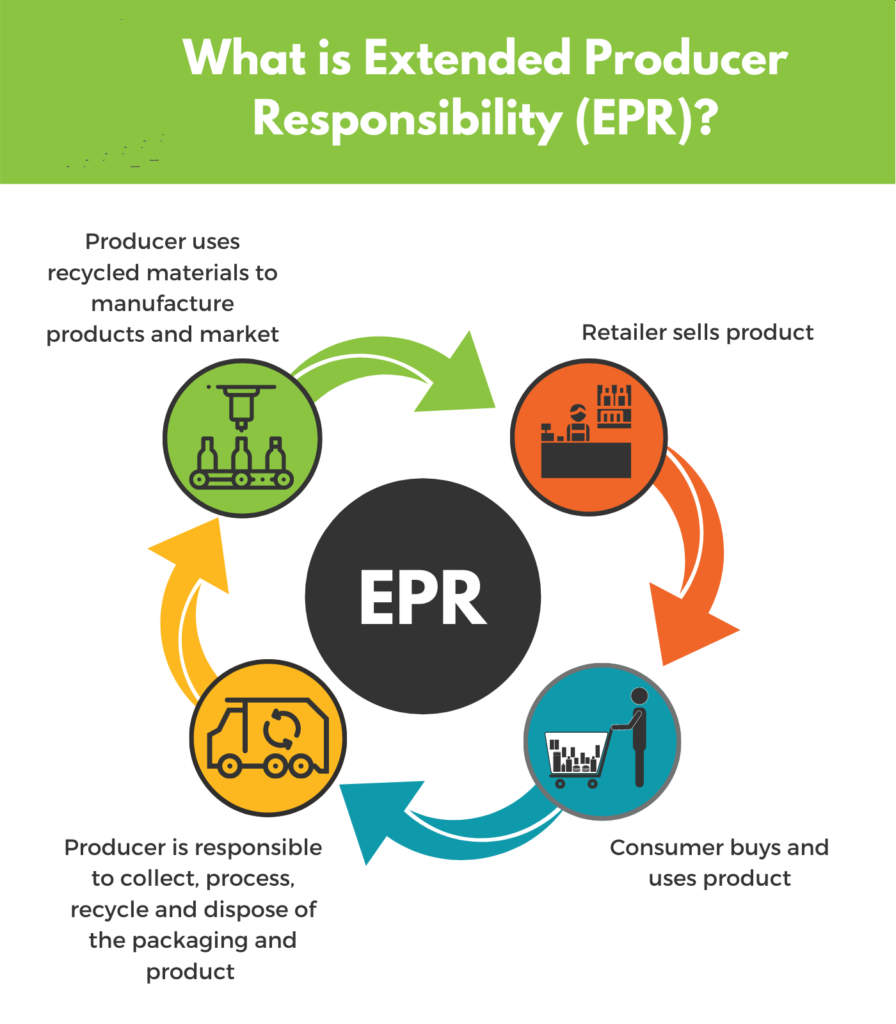Introduction
Extended Producer Responsibility (EPR) is an environmental policy aimed at improving waste management by holding manufacturers accountable for the whole environmental impact of their products throughout their life cycle, particularly in terms of waste treatment and disposal. The “Polluter Pays Principle,” according to which the polluter is held responsible for whatever environmental damage he or she does and must pay to remediate those damages, is the bedrock of this policy.
Under EPR, manufacturers/brand owners can be encouraged to govern product design and packaging, allowing them to produce eco-friendly products and buy back and manage their own wastes. This may also encourage manufacturers to create products that can be reused multiple times, reducing their overall environmental effect.

Components of EPR
The different components of an EPR are as follows:
Producers: The producers form the central component of the Extended Producers Responsibility(EPR) policy. As per this policy, the costs of the environmental damage caused by this product will be included in the overall cost of the product, which may discourage consumers from purchasing such products. Thus, the producers are compelled to create their product in such a manner that it doesn’t damage the environment by enhancing its recyclability, reusability and durability.
A Producer Responsibility Organization(PRO) may be formed if individual producers are involved. This organization ensures that the individual producers properly handle and dispose off their waste products to prevent any environmental damage. Collection, transportation and the disposal as well as recycling of these products is supervised by the PRO.
Consumers: Proper disposal of used products at the designated collection sites is performed by the consumers, or the common people who use these products for various purposes. Consumers may also help in the proper management of these wastes by paying a unit fee that is charged at the point of sale which is then collected by the PRO.
Government: The primary role of the government is to oversee the proper implementation of the EPR program within various industries. It can do so by establishing certain performance standards and monitoring protocols in order to monitor the handling of the waste products by the industries. EPR programs may be enacted by the governments recover the useful raw materials from the End Of Life Products or to reduce the amount of wastes generated.
Advantages of EPR
There are many advantages of EPR :
Reduced Waste generation: Since this policy also makes it mandatory for producers to include the environmental costs of their product to the actual price of their products, the producers will be compelled to buy back the End Of Life products from the consumers and recycle and reuse them with minimal impact on the environment which will drastically reduce the amount of waste generated.
Innovating to create more eco-friendly products: The EPR policy motivates the producers to innovate using financial means. Producers can innovate by making their products more durable, recyclable, reusable, by using fewer raw materials to design their product, and by introducing other such modifications to make their products more eco-friendly.
Preventing the export of e-waste by countries: Under this policy, those countries which export their e-wastes to less developed countries will be less likely to do so in the future and will be forced to construct centers that recycle and reuse electronic wastes in an eco-friendly manner.
Shifting of responsibility from government to producers: Before the enactment of this policy, it was the government’s responsibility to properly manage the End of Life products for which it had to put in at lot of money. Now with the introduction of this policy, the producers should take care of the wastes generated by their products.
Disadvantages
The disadvantages of the EPR policy are as follows:
Increases price of products: As per this policy, the producers must include the costs of recycling to the price of their product which increases the initial price of their products. As a consequence, the cost of electronic items could go up drastically since recycling electronic items is a cumbersome task. This could discourage consumers from purchasing such products.
Discourages the import of products from other countries: An unintended consequence of the EPR policy is that it discourages the producers from other countries with no EPR policy from sending their products into countries which have strict EPR policies since the producers in other countries will not want to pay extra for the import of their goods.
